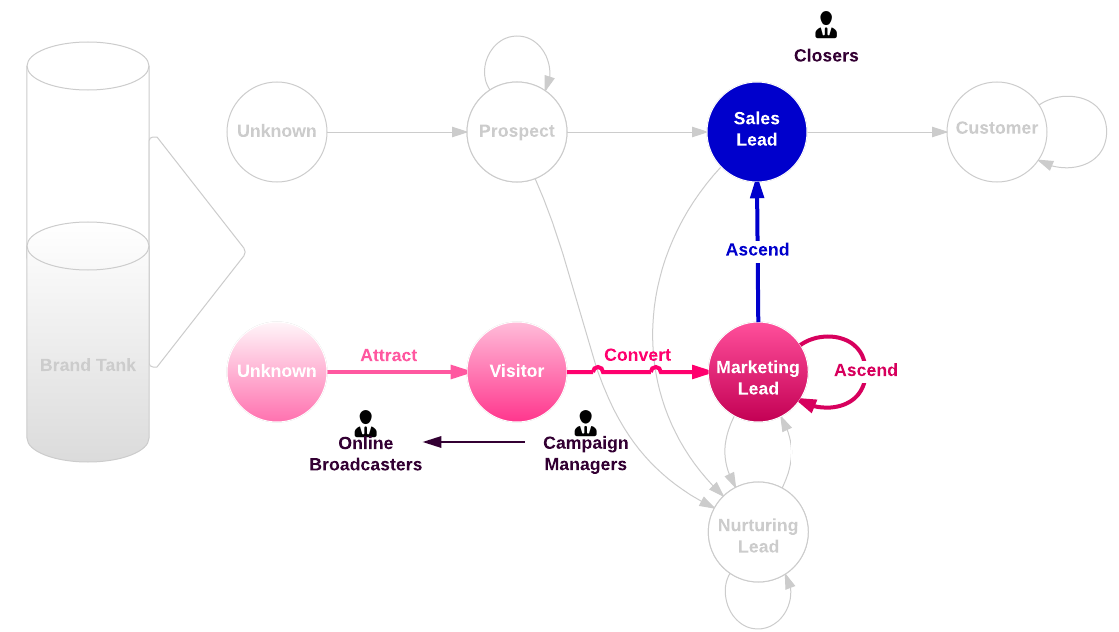Inbound Sales: How Inbound Marketers Can Sell

Most Inbound Marketers we meet fall into one of two categories:
- They want to improve their Inbound Marketing skills.
- They are proficient at Inbound Marketing but their leads aren’t converting into sales.
Very few fall into the third and final category: They are proficient at Inbound Marketing AND their leads generate a lot of revenue.
In this blog post, we’ll show you how to marry your marketing efforts directly to sales results and make marketing the most strategically important component of your company. Read more to learn how.
What most Inbound Marketers don’t know
As Inbound Marketers ourselves, we have seen firsthand that Hubspot’s Inbound Marketing Methodology produces fantastic results:
Most Inbound Marketers we meet are great at “Attract” and “Convert”. But very few know how to “Close” and “Delight”. Once they get a lead, they simply hand it over to sales and let them do the rest.
This means are only doing half their job.
Unfortunately, Hubspot’s methodology doesn’t provide much detail into how an Inbound Marketer can actually close a lead. In this blog post, we will break down the “Close” part for you.
How the best inbound marketers sell to their leads
The colored sections below from the Unified Business Model (UBM) for Sales and Marketing Alignment adds the missing steps to Hubspot’s model:

The first two steps are the same as in Hubspot’s model, but the key is in the added third step:
- Attract Unknowns (Hubspot calls them Strangers) into Visitors
- Convert Visitors into Marketing Leads (Hubspot calls them Leads)
- Ascend Marketing Lead into Sales Leads
You will also notice the different roles responsible for the different stages (although one employee can carry multiple roles if you don’t have enough resources.) Each role in your marketing organization has a different purpose.
Read on to find out what each role does. By understanding this, you will understand how an inbound marketer can sell.
Step 1: Attract Visitors with the right type of content
Online Broadcasters are responsible for attracting Unknowns into Visitors:
The Online Broadcaster reaches out to people who are not yet in your database with regular interesting content. Ideally, each piece of content targets a specific buyer persona in a specific stage of the buyer’s journey. The content should be easily found by people searching for a targeted keyword, provide value, and entice the reader to click a link or call to action.
Step 2: Convert Visitors to Leads using Conversion Campaigns
The Campaign Manager is the heart of the Inbound Sales methodology:
This role is responsible for regularly launching new Offers. Offers can be for example new whitepapers, case studies, webinars or useful tools. For each such launch, the Online Broadcaster sends targeted broadcasts to drive new visitors.
If you launch new offers regularly and track your sales and marketing KPIs, you will be able to accurately estimate conversion rates. Your Online Broadcasters can then use this information to pay for advertising to get even more visitors.
So what do you do now that you’ve converted visitors into leads? This is where most inbound marketers falter but where you can stand out.
Step 3: Ascend sales ready leads from the rest
Just because someone filled out a form doesn’t mean that they are interested in talking with a salesperson. But it also doesn’t mean that you should passively wait for them to contact you.
Instead, the campaign manager can attach an Ascension Campaign to each offer:
An Ascension Campaign is an automated series of relevant promotional emails to leads who downloaded an offer. It promotes a small related purchase (if you have such products) or a meeting with a salesperson to learn more about the subject of the offer. Learn more about Ascension Campaigns from Digital Marketer.
By using Ascension Campaigns, you avoid annoying leads who are not interested in talking to a salesperson, but you catch the ones who are.
Step 4: Qualify and sharpen your inbound marketing efforts
Even if the leads ask for a meeting, most of them will not be able to buy.
That’s why inbound leads should be qualified just like outbound leads: The salesperson should find out if they are decision makers, if they experience a clear pain, and whether your solutions can relieve that pain:
Your Campaign Managers should work closely with the sales manager to define the qualification criteria. This will help you in two ways:
1) The close rate of your leads will increase because salespeople can spend an unproportionate amount of effort creating excellent individualized presentations for closeable leads, rather than mediocre presentations to all leads.
2) Your inbound marketing efforts will sharpen because the Campaign Managers will get direct and valuable feedback about which conversion campaigns are producing qualified leads.
We’ve taken you through the entire Inbound Marketing process including how you as a marketing manager can actually turn leads into revenue.
But what about the leads that don’t respond to your Ascension Campaign or are not qualified? In the next blog post, we will explain how to use lead nurturing best practices to take care of these leads and provide immense value for your business. That will be the the third and final sub-process in this complete guide on how to align marketing and sales.






